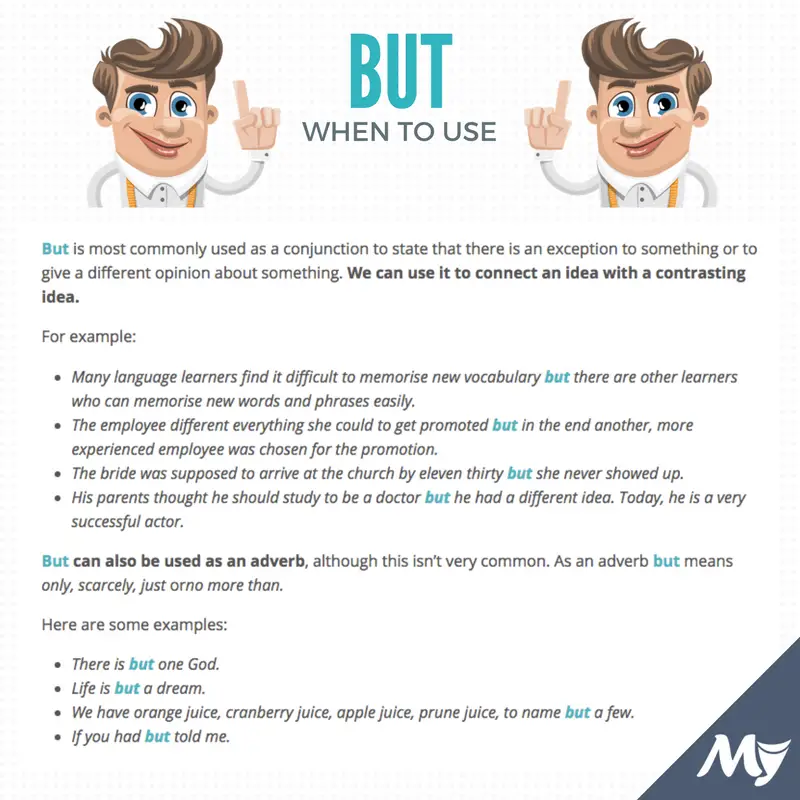
Whatever, so, but and for are used a lot in both spoken English and written English. They can often be used as conjunctions, adverbs, adjectives or pronouns. They can have slightly similar meanings and can confuse some learners. So let’s take a look at the differences between these four words and see how to use them in spoken or written English.
Whatever
Whatever is a pronoun and means anything or everything, it doesn’t matter what the thing is.
Let’s look at a few examples to see how to use the pronoun.
- “What do you want for dinner? Lasagne or chicken stir fry?” “I’ll have whatever, I don’t mind.”
- “You can be whatever you want to be but you have to love what you do and be dedicated to the profession, if you want to be happy and successful in life.” The career guidance teacher told his students.
- Whatever the problem is, there is always a solution.
- “Whatever your decision is, your family will always be here to support you.” The mother told her son.
So
We can use so as an adverb, adjective, conjunction or a pronoun. The way we use the word so whether it be as an adverb, adjective, conjunction or a pronoun changes the meaning of the word.
For example, when we use the word so followed by an adverb or an adjective so is an adverb of degree. Take a look at the sentences below:
- It is so cold outside.
- We have so much work to do
- I am so tired.
From the sentences above, we can see that so as an adverb shows us to what degree the cold temperature is outside, it isn’t slightly cold or a little bit cold, it’s so cold, extremely cold. In the other two sentences the adverb shows us the huge amount of work that needs to be done and the degree of extreme tiredness somebody is feeling.
Another way we can use so as an adverb is when we want to express sarcasm or surprise.
For example:
- “So you’re going to go out dressed like that?” the mother said in astonishment to her daughter.
- “So you think your team actually have a chance?” the rival coach mocked the team’s goalkeeper.
We use so as an adjective to agree with something.
For example:
- “I heard the event had to be cancelled, is that so?”
- They wouldn’t have done it if it weren’t so.
As a conjunction, so is another way of saying therefore, hence, then or accordingly.
For example:
- The students were late for the lesson so the teacher decided to surprise them with a pop quiz.
- There was a fire drill in the building during the employees lunch hour so they had to follow procedure and make their way safely and calmly outside.
Finally, we can use so as a pronoun to refer to something that has just been suggested or mentioned.
For example:
- “If you have not stated your desired course on your college application, please do so before Monday evening.” The guidance counsellor advised her students.
- “Is it true that the election was fixed?” “I think so.”
________________________________________
More for you:
Advanced English Grammar and Vocabulary Test with Real Time …
‘Neither do I’ vs ‘So do I’
When to use FOR and TO
When to use But vs. However?
________________________________________
But
But is most commonly used as a conjunction to state that there is an exception to something or to give a different opinion about something. We can use it to connect an idea with a contrasting idea.
For example:
- Many language learners find it difficult to memorise new vocabulary but there are other learners who can memorise new words and phrases easily.
- The employee different everything she could to get promoted but in the end another, more experienced employee was chosen for the promotion.
- The bride was supposed to arrive at the church by eleven thirty but she never showed up.
- His parents thought he should study to be a doctor but he had a different idea. Today, he is a very successful actor.
But can also be used as an adverb, although this isn’t very common. As an adverb but means only, scarcely, just orno more than.
Here are some examples:
- There is but one God.
- Life is but a dream.
- We have orange juice, cranberry juice, apple juice, prune juice, to name but a few.
- If you had but told me.
For
For is a preposition and is usually used before a noun or a gerund verb. Like most prepositions, for can be used in various ways.
For example:
For can signify the purpose of something:
- The house is for sale.
- We need a babysitter for the children.
For can be used when talking about a result:
- “I heard that she is going to prison, do you know what for?” “She was put on trial for manslaughter and was convicted.”
We use for to talk about distance:
- They drove for miles before they arrived at the destination.
We use for to talk about time:
- The employees worked for hours until the project was complete.
We use for when something is intended for somebody or something:
- “The phone call is for you” the receptionist said.
- The gift is for the birthday girl.
________________________________________
More for you:
What is the meaning of ‘so as to understand’?
Also – Too – Either – So – Neither – As Well
Difference Between VERY, QUITE, TOO and SO!
“etc”, “and so on”, “and so forth” meanings


























